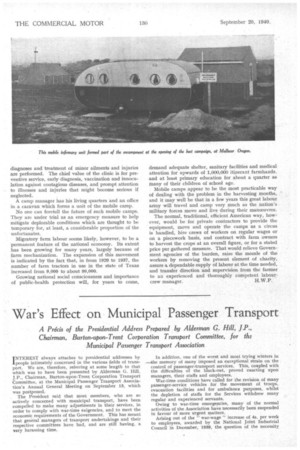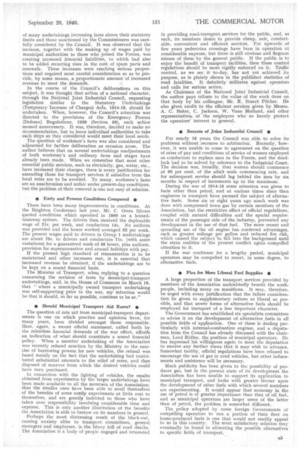War's Effect on Municipal Passenger Transport
Page 28

Page 29

If you've noticed an error in this article please click here to report it so we can fix it.
A Précis of the Presidential Address Prepared by Alderman G. Hill, J.P., Chairman, Burton-upon-Trent Corporation Transport Committee, for the Municipal Passenger Transport Association
I NTEREST always attaches to presidential addresses by people intimately concerned in the various fields of transport. We are, therefore, referring at some length to that which was to have been presented by Alderman G. Hill, J.P., Chairman, Burton-upon-Trent Corporation Transport Committee, at the Municipal Passenger Transport Association's Annual General Meeting on September 13, which was postponed.
The President said that most members, who are so actively concerned with municipal transport, have been compelled to make many adjustments in their services, in order to comply with war-time exigencies, and to meet the economic requirements of the Government. This has meant that general managers of transport undertakings and their respective committees have had, and are still having, a very harassing time. In addition, one of the worst and most trying winters in —the memory of many imposed an exceptional strain on the control of passenger-transport services. This, coupled with the difficulties of the black-out, proved exacting upon managers, their staffs and employees.
War-time conditions have called for the revision of many passenger-service vehicles for the movement of troops, evacuation facilities and for ambulance purposes, whilst the depletion of staffs for the Services withdrew many regular and experienced servants.
Owing to war-time emergencies, many of the normal activities of the Association have necessarily been suspended in favour of more urgent matters.
Arising out of the " war-wage " increase of 4s. per week to employees, awarded by the National Joint Industrial Council in December, 1939, the question of the necessity of many undertakings increasing fares above their statutory limits and those sanctioned by the Commissioners was carefully considered by the Council. It was observed that the increase, together with the making up of wages paid by municipal authorities to those who joined the Forces, was creating increased financial liabilities, to which had also to be added recurring rises in the cost of spare parts and renewals. These increases were reaching serious proportions and required most careful consideration so as to provide, by some means, a proportionate amount of increased revenue to meet the demands.
In the course of the Council's deliberations on this subject, it was thought that action of a national character, through the National Joint Industrial Council, requesting legislation similar to the Statutory Undertakings (Temporary Increase of Charges) Ads, 1914-18, should be undertaken. When, however, the Council's attention was directed to the provisions of the Emergency Powers (Defence) Regulations, 1939 (Section 56), such action seemed unnecessary. It was, therefore, decided to make no recommendation, but to leave individual authorities to take such steps as they considered would meet their local needs.
The question of workmen's fares was also considered and adjourned for further deliberation as occasion arose. The author believes that on several undertakings readjustments of both workmen's and ordinary fares and stages have already been made. When we remember that most other essential public services, such as electricity, gas, water, etc., have increased their charges, there is every justification for amending those for transport services if subsidies from the local rates are to be avoided. To many, workmen's fares are an anachronism and unfair under present-day conditions, but the problem of their removal is one not easy of solution.
• Early and Present Conditions Compared •
There have been many improvements in conditions. At the Brighton Conference last year, Mr. C. Owen Silvers quoted conditions which operated in 1899 on a horsedtramway system. The drivers then received the deplorable wage of 21s. per week, and conductors 14s. No uniform was provided and the hours worked averaged 92 per week. The present wages paid to drivers in Group 1 undertakings are about 75s. to drivers and conductors 71s. (with some variations) for a guaranteed week of 48 hours, plus uniform, provision for superannuation and annual holidays with pay.
If the present high standard of remuneration is to be maintained and other increases met, it is essential that increased revenue be obtained, if the undertakings are to be kept on a sound financial basis.
The Minister of Transport, when replying to a question concerning the revision of fares by municipal-transport undertakings, said, in the House of Commons on March 16, that "where a municipally owned transport undertaking was self-supporting prior to the war, my intention would be that it should, so far as possible, continue to be so."
• Should Municipal Transport Aid Rates? • The question of rate aid from municipal-transport departments is one on which practice and opinions have, for many years, been divided amongst those responsible. Here, again, a recent official statement, called forth by the relentless financial demands of the war effort, affords an indication of what should constitute a sound financial policy. When a member undertaking of the Association was recently refused sanction by the Ministry to the exercise of borrowing powers for new vehicles, the refusal was based mainly on the fact that the undertaking had contributed substantial amounts to the relief of rates, and thus disposed of reserves from which the desired vehicles could have been purchased.
In connection with the lighting of vehicles, the results obtained from experiments by the larger undertakings have been made available to all the members of the Association; thus the smaller ones have been able to avail themselves of the benefits of some costly experiments at little cost to themselves, and are greatly indebted to those who have taken over responsibility involving considerable time and expense. This is only another illustration of the benefits the Association is able to bestow on its members in general.
Perhaps the most distressing result of the black-out, causing anxiety alike to transport committees, general managers and employees, is .the 116.vy toll of road deaths. The Association is a body of people engaged and interested in providing road-transport services for the public, and, as such, its members desire to provide cheap, safe, comfortable, convenient and efficient services. For upwards of five years pedestrian crossings have been in operation at considerable expense, but there is still obvious and flagrant misuse of them by the general public. If the public is to enjoy the benefit of transport facilities, then these control regulations should be more rigidly enforced on it. Traffic control, as we see it to-day, has not yet achieved its purpose, as is plainly shown in the published statistics of road fatalities. It definitely militates against operators and calls for serious action.
As Chairman of the National Joint Industrial Council, the author pays tribute to the value of the work done on that body by his colleague, Mr. R. Stuart Pikher. He also gives credit to the efficient services given by Messrs. A. C. Baker, C. Jackson, W. Vane Morland, and other representatives of the employers who so keenly protect the operators' interest in general.
• Success of joint Industrial Council • For nearly 16 years the Council was able to solve its problems without recourse to arbitration. Recently, however, it was unable to come to agreement on the question of rates of pay and conditions of service of women employed as conductors to replace men in the Forces, and the deadlock had to be solved by reference to the Industrial Court. The decision was, broadly, that women should commence at 90 per cent, of the adult male commencing rate, and for subsequent service should lag behind the men by six months in respect of increments up to the maximum.
During the war of 1914-18 some attention was given to fuels other than petrol, and at various times since then engineers in transport have pursued the subject of alternative fuels. Some six or eight years ago much work was done with compressed town-gas by certain members of the Association, but the restrictive effect of official regulations, coupled with natural difficulties and the special requirements of the passenger side of the industry, prevented any development in the use of that fuel. The more recent and spreading use of the oil engine has conferred advantages, such as greater mileage per gallon and reduced fire risk, which caused the subject to fall into the background until the stern realities of the present conflict again compelled attention to it.
If the war continues for a lengthy period, municipal operators may be compelled to resort, in some degree, to alternative fuels.
• Flea be More Liberal Fuel Supplies •
A large proportion of the transport services provided by members of the Association undoubtedly benefit the workpeople, including many on munitions. It may, therefore, be urged with every justification that the fullest consideration be given to supplementary rations as liberal as possible, and that newer forms of alternative fuels should be employed for transport of a less important character.
The Government has established six specialists committees to advise it on the development of alternative fuels in all possible fields of application. One of these is dealing particularly with internal-combustion engines, and a deputation from the Council has already discussed with the chairman, Lord Ridley, the position of municipal operators. He has expressed his willingness again to meet the deputation to receive any further views that it may wish to advance. Somewhat tardily, official regulations have been relaxed to encourage the use of gas in road vehicles, but other inducements and assistance will be necessary.
Much publicity has been given to the possibility of producer gas, but in the present state of its development the Association has been unable to support its application to municipal transport, and looks with greater favour upon the development of other fuels with which several members are experimenting. It would appear that economy in the use of petrol is of greater importance than that of oil fuel, and as municipal operators are larger users of the latter than of petrol, the problem is somewhat different.
The policy adopted by some foreign Governments of compelling operators to run, a portion of their fleet on home-produced fuels is one that would not readily appeal to us in this country. The most satisfactory solution may eventually be found in allocating the possible alternatives to specific fields of transport.




























































